Darkthrone's Nocturno Culto: “When I write songs, inspiration can come from anywhere – even a gust of wind can trigger some kind of riff“
The guitarist, bassist and vocalist for the world's most uncompromising underground metal duo walks through the making of their latest album, Eternal Hails......
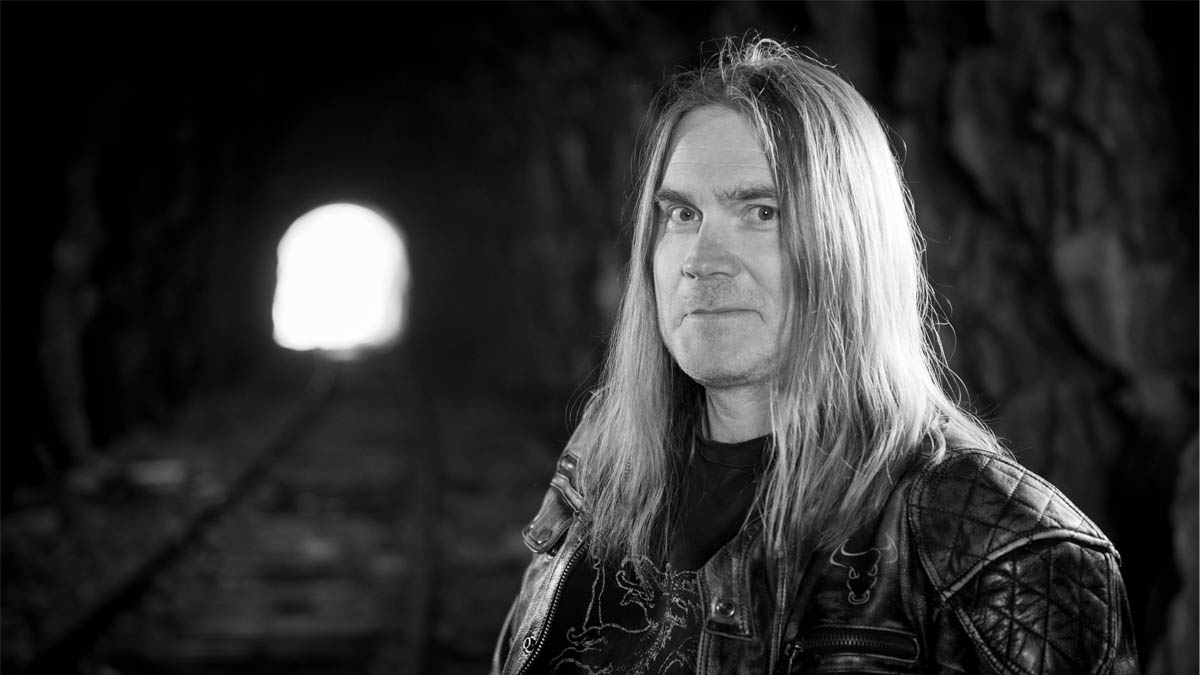
Want all the hottest music and gear news, reviews, deals, features and more, direct to your inbox? Sign up here.
You are now subscribed
Your newsletter sign-up was successful
When it comes time for Darkthrone to write a new record, is it as though the the black metal trailblazers turned underground revivalists spin the wheel on Heavy Metal history, and where it stops is where the writing starts. At least, that’s how it seems.
Twenty-first century Darkthrone might sound far removed from the necro iconoclasm of their early 90s era but it is unmistakably the sound of the partnership between Nocturno Culto on guitar, bass and vocals, Fenriz on drums and vocals. Darkthrone follow their own internal logic – and that can take them anywhere.
There are some that mourn the loss of the pure black metal fire, but those souls will be haunted by its reemergence when the occasion demands it. Black metal can still be found in Darkthrone’s sound. It's in the DNA. But now, and since 2005 really, it is set against a wider canvas of classic steel, unwashed punk, thrash metal, old-school death metal, the morbid palette of doom, and whatever else excites Nocturno Culto and Fenriz in the studio.
I took a long time on songwriting this time around because it there is something about making songs this long, you have to really think about the arrangement – there are a lot of things to consider
As Nocturno Culto explains, Darkthrone being a studio-only project has many advantages. It allows them to totally focus on the music, to experiment, playing around with electric guitar tones and using amplifiers and mics that would typically beyond their budget.
And because it helps keep the most prolific duo in extreme metal on speaking terms – kind of like golfing buddies who tee off with a Hellhammer riff and approach the green with the frenetic energy of English Dogs – the studio keeps the records coming. They record again in the autumn.
Their latest, Eternal Hails……, is typically audacious. It sees these creatures of habit venture of out their own Necrohell II studio in search of more analogue vintage equipment, converging upon Oslo’s Chaka Khan Studio to track five epics in the midst of a pandemic, in which, Nocturno Culto reveals, felt a little too much like normal….
Pretty much every conversation with the working musician brings up the fact that the pandemic has turned everything upside down, but for Darkthrone this is business as usual, albeit with the underlying tension from living during such a miserable time.
Want all the hottest music and gear news, reviews, deals, features and more, direct to your inbox? Sign up here.
“For my sake, it was not difficult to adjust to a pandemic because because I'm kind of an introvert. But in this last one-and-a-half years, my introvert personality has flourished. It feels strange to actually go out and meet people again. The whole thing just came very unexpected, and is kind of a life-changer in many ways…”
Life-changing? It’s not going to make Darkthrone play live, is it?
“No! [Laughs] I think both Fenriz and I like the gap between being creative and making albums, and, you know, being a circus artist on stage – it is two very different things. We don't like travelling either, so, there would be a lot of problems! [Laughs]“
Being able to focus on on albums is a privilege and, and for us, it makes sense. That is our life project
If you ever tour, it has to be captured on a Netflix fly-on-the-wall documentary.
“It kind of goes without saying, but if we were kind of a touring band from from day one, I think it would be it will be a very different thing now. I guess we’d hate each other… Everything would be wrong. Being able to focus on on albums is a privilege and, and for us, it makes sense. I mean, that is our life project. Yeah, I mean, are we comfortable with with the state of things now. I guess it’s always been like that that; when a new album is out, it’s already old news for us because we are looking forward to making more music and we have other ideas.”
You are the ultimate underground channel surfers, switching between all kinds of metal and metal-punk styles, and interpreting it through your internal logic.
“Fenriz and me, even though we don't talk about it, we are always somehow in sync when it comes to songwriting. This time around, the songs were very long. It was also kind of long songs on Old Star but we took it even further this time around. I think, for Fenriz part, he started where he left off in the demo days, you know, like, doing some kind of thrash metal... I don’t know. I find it very hard to describe our own music.
“But for my sake, I’m always starting off from scratch. When I write songs, inspiration can come from anywhere, from a piece of music, or even a gust of wind can trigger some kind of riff [Laughs], so it’s very hard to explain how it went on. I took a long time on songwriting this time around because it there is something about making songs this long, you have to really think about the arrangement – there are a lot of things to consider along the way. But I'm happy with it, and we're going back to the same studio again. Pretty soon, actually.”
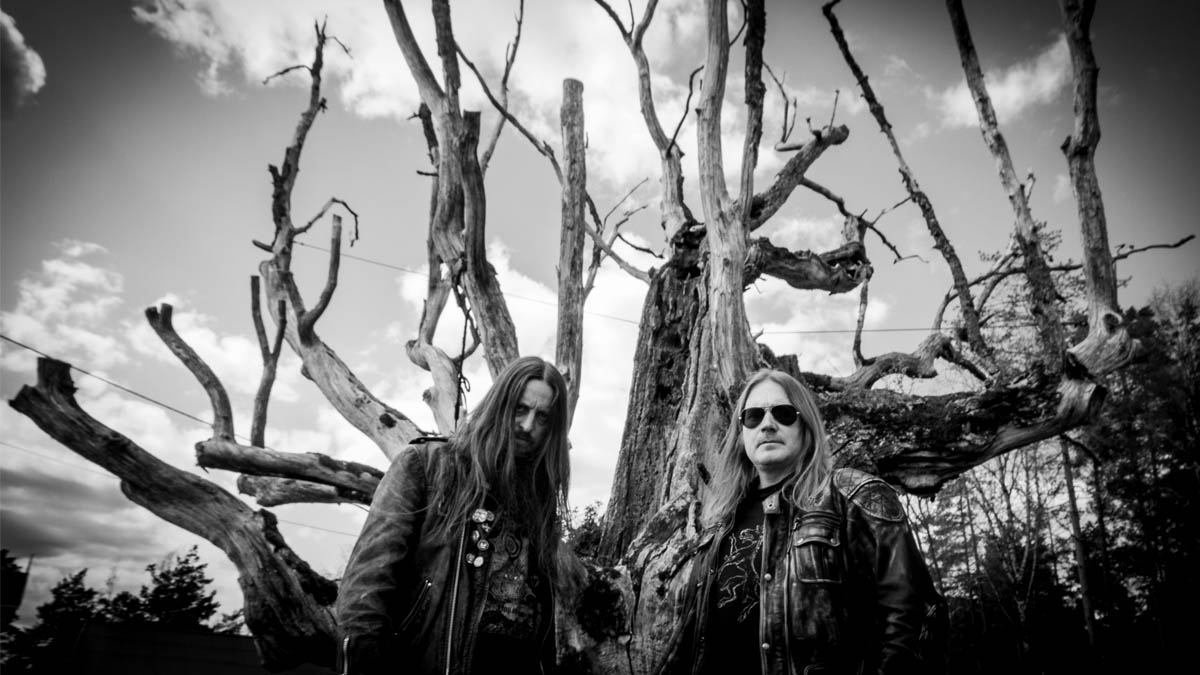
You never paid much attention to the boundaries between scenes and now it seems like that is becoming the norm in the underground. We talk about Darkthrone having an influence in on black metal, for sure, but maybe that is your biggest contribution.
“We have become the band who play every kind of metal, every style, and we are not afraid to mix those together. I mean, some of the songs on the new album go from thrash metal to doom, to black metal and heavy metal in an instant, and that’s what makes us happy.
”For us, it makes sense, because we I think we've been that kind of band for a long time now – especially since 2005 – and we are not afraid to do a lot of things in our music. I’m very happy we actually have the opportunity to do so. There are probably a lot of bands that, when you're when you’re making trillions of money, you have to stick to the formula that makes you successful, so I'm glad we carved out our own path and that people appreciate it,”
Yes, you’re just making millions, so there’s a bit of freedom in that...
“Yeah! [Laughs] Something like that!”
Brilliant. How much of a difference did the change of location make? You recorded Eternal Hails…… at Chaka Khan Studio in Oslo.
“That’s the thing, we picked out this studio initially because they had this kind of analogue profile. The studio was filled to the brim with very old analogue equipment, and that’s a nice thing. I thought that would suit us well. It's like when when you hear the echo on the vocals, it’s not a plugin, you know, it’s an old tape echo machine from the 70s.
“Dealing with so many analogue components makes it a bit more, let's say, uncontrollable! [Laughs] When you're dealing with a lot of the equipment at the same time, it’s more difficult, but it’s fun, and I think it sounds good. Overall, we got the sound we wanted, and the sound? You know, we always end up sounding like ourselves.
I want to make a logo, sticker or something that we can have on the future albums that says, ‘No metronome since 1997’
“It’s very strange, because this time around I thought it would probably sound different. Of course, it does – the drums have a better quality sound, but the guitars are almost putting us back to the 90s again. There are several things to consider in that kind of studio, and besides that, the two people that we worked with in the studio [Ole Ovstedal and Silje Høgevold] are great people, and we really had a good time doing it.
“I mean, we are not the kind of guys that hang around. When we are in the studio we usually work all the time, at least till we until we feel we have control of the situation, and even the recording process was the same as all the previous years when we had our own studio. We are recording live drums and one guitar, so the core of the album is live.
“When I think about it, we are are very proud about this. I want to make a logo, sticker or something that we can have on the future albums that says, ‘No metronome since 1997’. [Laughs] I think us playing like the skeleton of our albums are live so it feels very organic, because it is us playing together, and also the fact that we don't use a metronome makes it sound like a band are actually playing.
And when tempo rushes a little we know Fenriz is getting excited...
“Yeah, yeah. Exactly! I think that kind of variation and uncertainty, we are doing our best, of course, but you can’t play like a machine but I think that makes our sound organic. I never played together with a computer so for me it would be strange to play with something other other than Fenriz.”
Did you record to tape?
“Well, I'll tell you what, everything is analogue in that studio, except for where the music goes in. That’s a computer. But when we did the mixing, when we mix down every song, it was on computer but also on tape, so we could we could change the the amount of analogue tape we wanted in the mix It’s a combination.
I like to think of an album as a painting. On all good paintings you want a frame that suits it. We like more strange framing, so it makes people feel something
The record sounds great. Of course you need it analogue and to be raw, but if you go to a studio like that, you want it to sound more than a demo. There’s a balancing act in metal, especially your sound, to sound raw and unworked but still good. There are frequencies that need to sound nice, others can be nasty.
“I think I like to think of an album as a painting, you know. You can imagine a great painting, and you can see the music as the actual painting. But on all good paintings you want a frame that suits it. The framing is always important on paintings. And I think our sound, and our sound production, is always like the frame of what we’re doing, and it is important for us. You can always put a plastic frame on everything – and somebody will like that as well – but we like more strange framing, so it makes people feel something.“
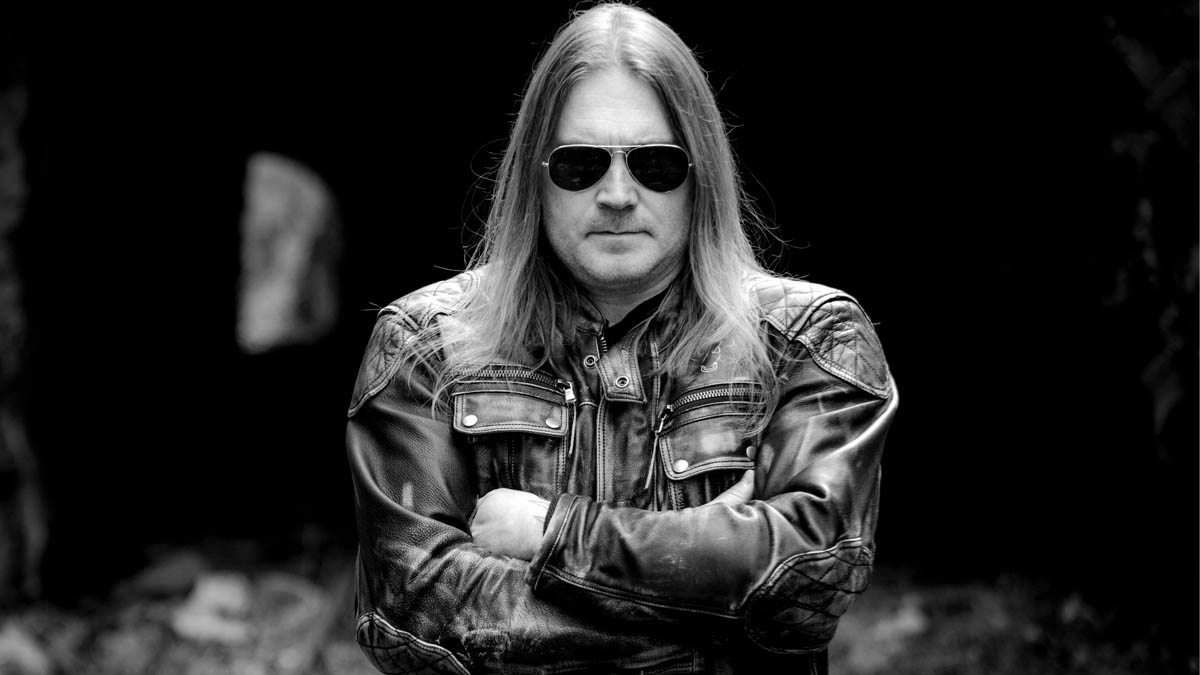
What about the guitars? The rhythm tone – which is always the key ingredient – sounds great.
“I was using solar guitars, this time around. I have kind of retired my Les Paul for a while. I played that for many years and I tried out some new guitars. And I found them awesome. I played a lot of guitars last year, but I landed on Solar Guitars and it was great. I have a couple of those and that’s what I'm playing now.
“When it comes to guitar, it’s like, when I buy a wristwatch, I’m not looking for jewellery, you know! I'm looking for solid things that do the job – and, of course, looks have something to say sometimes but I want it to be solid and reliable, and have a good tone and quality feel to it.”
And you are in danger of being a quasi-public figure now, doing gear demos… You’re not going to become a YouTube phenomenon are you?
“[Laughs] Yeah, well I had some contact with them early last year and it’s great to have contact with them, and also we have a signature model on on the horizon…“
When it comes to guitar, it’s like, when I buy a wristwatch, I’m not looking for jewellery, you know! I'm looking for solid things that do the job
Nice. What can you tell us about that?
“Aaaaaah, I don’t think I can say anything. [Laughs] But I guess it will be revealed, you know, pretty soon. Definitely, within this year, and, you know, as all, you know, guitar manufacturers, they have run into some Covid-19 problems all over the world. It’s difficult - everything goes a bit slower than it it will usually go.”
Definitely. Everyone is having trouble working around that. If we were to bet money, we’d say it’d be a singlecut with a natural finish, or something like that.
“I have no comment! [Laughs].”
Sure, all in good time... What about the amplifiers on the record?
“When we were in the studio, we used all kinds of different amplifiers. I can't remember – but we did some special kind of technique I never done before, having the guitar amplifier elements inside their own box. I think, for the next album, we will do them a bit more traditional way. I guess we will use some Mesa/Boogie on the next album in a more traditional way and we will see how that sounds.
“That will be interesting. In the studio this time around, it was of course a bit overwhelming, and since I've been responsible for every recording since 2005, for me, to not have have that responsibility was great because I could just focus on playing guitar… And bass! And that was awesome.”
But you are still very involved in the nitty gritty of recording…
“Of course. We involve ourselves in all those those micro-processes in the studio, and what we learned from this time around is very valuable when we will go into the same studio this autumn. We will learn from what we did right and what we could do better.”
The drum set Fenriz played on this album was a Ludwig kit from the late 70s that was actually used on stage by Carmine Appice in Norway, playing with Rob Stewart. That’s a fun fact
It’s funny, changing studio after so much time, and this is probably the same for every artist, you have to learn to play the space that you’re in.
“Absolutely, and I think also being in a place like we are, we are mostly in charge of how the album will sound anyway, compared to big bands – they must go through probably much of the same channels every time but I think some of the creativity of making an album goes with the sound and how we want it to feel and and how the audience will feel. We pretty much set the mood in the studio and I’m trying to reflect that on the album.”
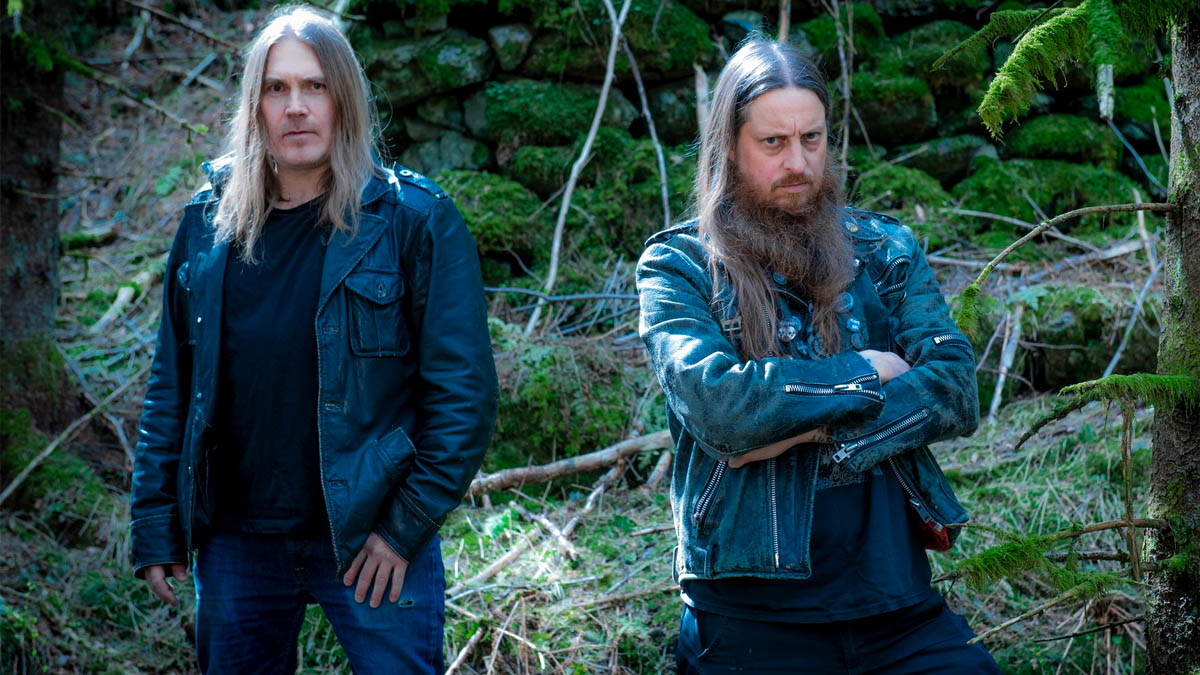
And for Darkthrone in particular, getting that production, that sound and atmosphere right, is absolutely crucial.
“It is always very unsure. Everything is. When you go to a professional studio like this, you at least know that the drums will sound right, and as you hear on the bass drum on this album, that is the bass drum sound that that we like. The drum set Fenriz played on this album will be on the next album as well. Actually, what the fuck was the name of the brand? I have to get it right… Ludwig! And that was a drum kit from the late 70s that was actually used on stage by Carmine Appice in Norway, playing with Rob Stewart. That’s a fun fact.”
That's amazing. In heavy metal, it's nice to think that there's some sort of cosmic happenstance making everything happen.
“In the early days, we kind of imagined how we wanted it to sound Okay, you go to A Blaze In The Northern Sky and Under A Funeral Moon, those those two albums became more or less the exact same vision that we had in our heads. But after that, it was more coincidence.
“I have tried to imagine how I wanted the album to sound, because when you're sitting, and you're making music, you have some kind of a sound in your head but it never turns out the way you were thinking, so now we will be more relaxed about it because we know we will sound like us. Since we have done this so many times, we know what to expect, and we know how to make sure it goes at least in the direction we want.”
The sound in your head can also be overrated. We can be too attached to it and miss something better that is happening in the room in front of us. But it is good to have an idea before you go in of what sounds are going to work
“Because we haven't haven't worked with those people in the studio before, we had some reference albums, two albums that we gave them to use as a reference for the direction we wanted, and those two albums were the Trouble album from 1990, and it was Metallica’s Ride the Lightning album.”
When I was a kid, back in the mid 80s, I found a Ride The Lightning back patch in downtown Oslo. When I got back on my on my vest, I knew I was absolutely the coolest kid on the block
Two of the best productions in metal...
“Yeah, it’s kind of the direction we wanted on our albums. Not to copy them, of course, but it’s like the feeling, you know, of both those albums. If it’s guitars, drums, whatever. On Ride The Lightning, we liked the reverb, those kinds of atmospheric things, and the Trouble album has a great sound – drum sounds, everything.”
And taking the aggression of that Trouble rhythm guitar tone and the cold reverb of Ride The Lightning... It's a nice combination.
“I remember when I was a kid, back in the mid '80s, I found a Ride The Lightning back patch in downtown Oslo. When I got back and put it on my vest, I knew I was absolutely the coolest kid on the block. [Laughs]“
Unquestionably! It is funny how Metallica are so incredibly popular and when you listen to those old records – which millions and millions enjoy – they are so underground sounding.
“Absolutely! I like the first three Metallica albums but I have to say those albums are extremely important and so good. They're so amazing, you know, and therefore I always have to respect Metallica, no matter what.“
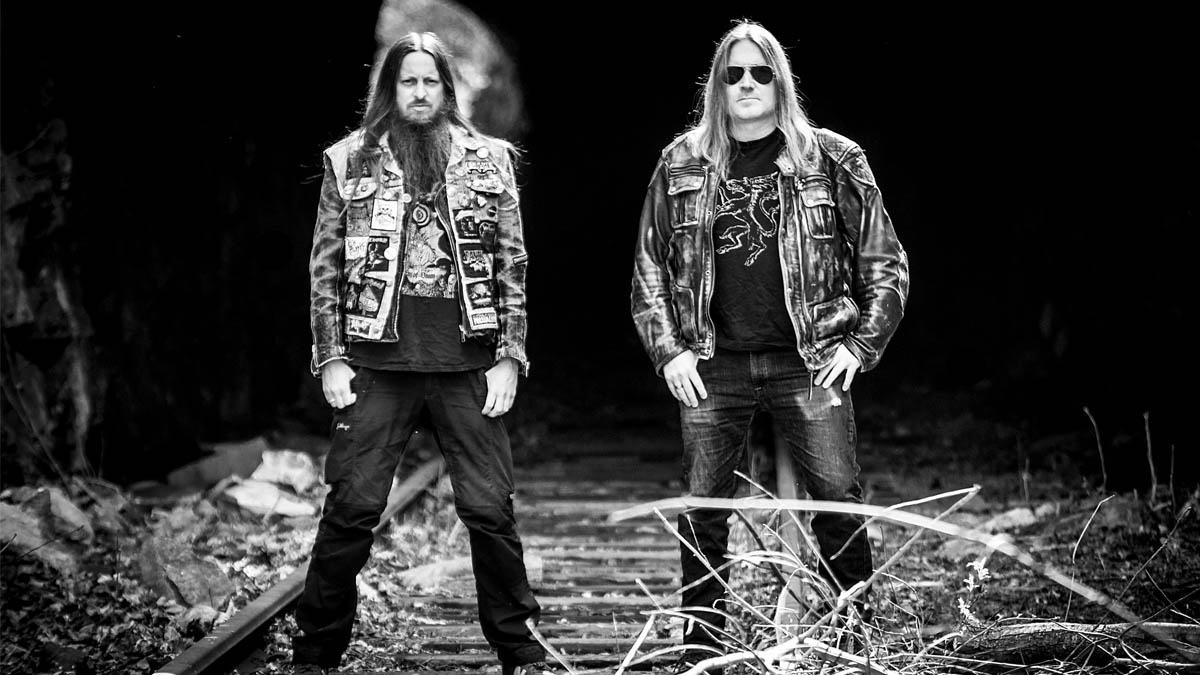
Using classic records as reference albums is a lot easier than using contemporary productions where too much sounds the same.
“When I listen to music, it's always going back to the things I know and appreciate, very often back to the '60s, '70s and '80s. That that's the way it is.“
There was maybe a little more freedom then, or the illusion of it, because the results were a little more unpredictable.
“Absolutely. that's one of the things that makes the '70s so great, because everything was analogue and every studio around the world had components that made the result a bit more unpredictable for bands. Of course, they had their equipment with them in the studio, but that’s why no band really did sound alike back then – because they were in different studios and they have different results. Now everything is more streamlined through certain ways of doing things and that's kind of boring.“
- Darkthrone's Eternal Hails...... is out now via Peaceville.
Jonathan Horsley has been writing about guitars and guitar culture since 2005, playing them since 1990, and regularly contributes to MusicRadar, Total Guitar and Guitar World. He uses Jazz III nylon picks, 10s during the week, 9s at the weekend, and shamefully still struggles with rhythm figure one of Van Halen’s Panama.
